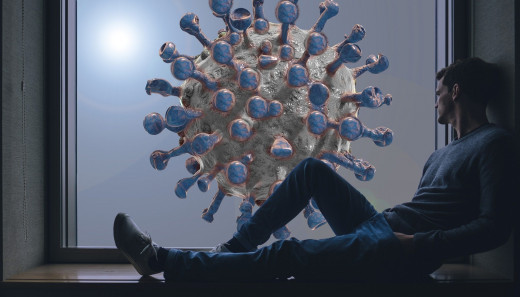What we are doing staying at home?
July 25, 1985. A five-year-old boy named John Morley died at his home. That was the first death from the plague at Cambridge. Isaac Newton, a 23-year-old student at Trinity College, University of Cambridge, was quickly leaving the city for isolation. Newton's home was in the village of Ulsthorpe, sixty miles north of Cambridge. Newton went there to escape the plague. He spent almost two years there. In that time he discovered the groundbreaking theories of nature and mathematics that changed human civilization - calculus, dynamics, gravity, optics, etc. At this time when the world has come to a standstill due to the terrible infection of coronavirus, you are also sitting at home like Newton. University student Newton changed the world in that leisure, what are you doing?
 |
| Image by Gerd Altmann |
You must have seen various types of writings or at least Facebook posts while tapping the phone at home. So shouldn't you be ashamed to spend a failed quarantine?
No. First, none of us, and perhaps none in the history of human civilization, will be able to achieve near Newton. The biggest thing is that Newton was able to develop his talent only because of the epidemic, which is popular but far from reality. Perhaps this idea originated from Newton's apple tree. Thanks to the famous French writer and philosopher Voltaire, the story reached all corners of the globe, at all times.
Newton's Story
Newton came to the end of his life and told the story himself. An apple tree (still a descendant of that tree and still there) in front of the door of his house, Newton was sitting under it thinking. Suddenly he realizes that the reason why the apple falls to the ground and the moon revolves around the earth is actually the same. This story teaches us wrong, many people come in a hurry to understand the success. It doesn't take a lot of hard work to break it - the momentous idea will come like a flash of light in a moment. Of course, it needs the right environment - as Newton got and we got because of being in isolation due to the epidemic.
True, in the two years leading up to the epidemic, Newton was able to make incredible discoveries in mathematics and physics. But the problem is that Newton was able to achieve this because he was forced to live in isolation. When Newton was in Cambridge, he began to think about the mysteries of the universe. There was a note in Newton's handwriting - a list of some of the unsolved problems in science that he wanted to work on. That list contained some philosophical problems (science was called natural philosophy in those days) - such as time, space, motion, gravity, light, color, and so on. Newton worked with all of this in the following decades. While at Cambridge before the epidemic, he made great strides in researching new methods of calculus and geometry. Similarly, all his research did not end even after the epidemic. Back in Cambridge, Newton continued his research. His research on light came to an end at the end of that decade. Many works of mathematics and geometry continue even after this. It took almost two decades for his ideas on gravity to be integrated into a truly readable form. So it is not scientifically correct to claim that the moment of two years of isolation or the moment an apple fell from a tree was more important than Newton's two decades of relentless work. When Newton was asked, how did he discover the law of gravitation? His answer was, "Think about it regularly."
The Conclusion
It's important to get the job done - as Newton did in his student life at Cambridge, in his two years of isolation, and on his return to Cambridge, even after becoming a professor at Cambridge. Newton's best time is not this year and a half, at least half a decade. Success came to Newton not because he was stuck at home or because the apple fell off, but because he thought relentlessly for a long time, doing calculations. So you don't have to be a Newton in isolation at the time of the corona - keep working on what the world of your thoughts was about before the corona, stick to it even after the epidemic.
